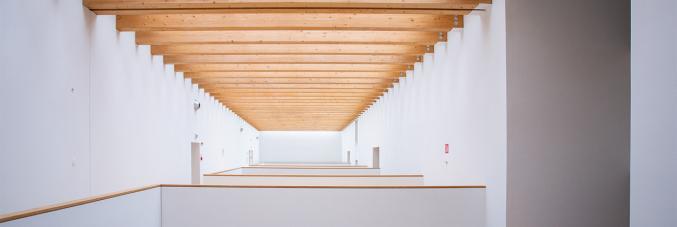
Beato Pellegrino, an avant garde centre for humanities. Rizzuto: " A collaborative effort between the university and its city"
04.10.2019
While the lessons of the new academic year have begun, the University of Padova has had the pleasure of inaugurating the Beato Pellegrino Complex as the headquarters of the new Humanistic Centre. The new complex covers a total area of 17,600 square meters, and is located between Via Beato Pellegrino and Via Elisabetta Vendramini, embracing the ancient cloisters of the Benedictine nuns, whose convent closed in 1806.
"We have been waiting a long time for this moment, said University Rector Rizzuto during the inauguration; it was a collaborative effort between the university and its city. The new Humanistic Centre in via Beato Pellegrino is the result of the University’s well-planned and collaborative efforts among all institutions, both within the city and its regional partners. A unity of determination, which has led to the result of what we can admire during today’s inauguration, also testified by the words of Mayor Sergio Giordani, Regional Councilor Roberto Marcato, and Prefect Renato Franceschelli. I want to thank all of those who made this day possible and for facilitating such an undertaking, the meaningful depth of this work is evident for Padua and its territory. More than ten years ago, the University's Board of Directors approved it in 2004. The area was purchased in December of the following year for the sum of 21 million euros, but despite the acquisition of the property, more than a few obstacles delayed the start of the work. Rector Zaccaria laid the first stone in June of 2015, while the project underwent adjustments to ensure its environmental sustainability. The work began in 2016 ... and since then we have been working diligently", continues Rizzuto, specifying that the goal to make the complex operational with the new academic year was successful due to staying on scheduled throughout its construction.
The complex houses 18 classrooms for teaching purposes that can hold up to 1500 students, as well as a new library with 356.341 volumes and 460 quiet spaces for students to study. The new Beato Pellegrino Library for literary, linguistic, pedagogical, and entertainment studies brings together different disciplinary under one location, "a heritage available on an open shelf", emphasises Giovanna Valenzano, author of the artistic heritage, museums and libraries. Virginia Libero, of the Student Academic Senate (Students for UDU), asserts that the new complex "is not a privilege, but the fruit of a policy taken by the university in respect of the rights of students."
The Beato Pellegrino Complex is therefore a piece of the history for Padua, which has returned to the community to be experienced by its citizens and its students. Once a convent, it became a recovery centre for the homeless. The building was then entrusted to the Franciscan Elisabettine nuns who, under the guidance of Elisabetta Vendramini, made it a hospice for young women. During the First World War, it was entrusted to the military but then bombed in 1917. In most recent years, it housed the elderly, while in 1972 it became a geriatric hospital, before being permanently closed in 2003.



